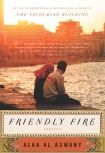Friendly Fire by Alaa Aswany (best e book reader TXT) 📗

- Author: Alaa Aswany
Book online «Friendly Fire by Alaa Aswany (best e book reader TXT) 📗». Author Alaa Aswany
The next day, I left the department and didn’t go back to the house. I went to Suleiman Pasha Square, to the big newspaper shop. The vendor smiled showing his gold teeth, pointed to a corner of the shop, and said, “The new foreign magazines are on the right and on the left are the old ones at quarter price.”
I paid no attention to the old magazines: the thought of a dust-covered or dog-eared foreign magazine upset me. I stood there for a long time. I leafed through magazines and looked and compared and in the end left after buying two—one French (even though I didn’t know French), the other American.
11
I spent that night like the one before. Silence, hashish, and dreams. I tried to read a political article in the American magazine but got bored and stopped. It was the pictures alone that attracted me. Everything in the pictures seemed marvelous; even the smallest things had a quiet glamour. A life of exuberance, variety, and resplendence. The streets and the buildings and the people, even the rain and the ice and the beaches. Artists with long beards standing in front of their paintings, musicians dressed all in black sitting at their instruments and sheet music. Even the demonstrations were marvelous—hundreds of people marching in a broad, clean square, their faces white and their hair blond, carrying placards of protest and moving forward in silence; policemen with their strong bodies, elegant uniforms, and shining badges surrounding the demonstration and protecting it. Sometimes a politician would address the demonstrators, in which case he would look dignified and usually be wearing glasses with elegant gold or silver frames. I finished the two magazines and the next day bought more. Day after day, I was totally bewitched. I went overboard, and even though I was so happy with my daily purchases, more than once I caught the newspaper vendor looking at me with doubt and anxiety as I paged through them. It seems he’d noticed that I looked mainly at the pictures, because one day he came up to me and said, “We have a poster inside that you’ll like. Want to see it?”
I didn’t know what poster meant, but when I followed him inside I discovered that it was a large colored photo that covered the wall. I counted the money I had with me and it wasn’t enough. I didn’t buy it but went and borrowed some from my mother and returned and came back to the house bearing four large posters. Huda helped me to cover the four walls of my room with them. I had to pile all my father’s paintings in the corner to make space for the posters, and I felt no sorrow or regret. My gloomy room now scintillated with shiny newness. Lying on my bed I could see on the wall a house in the countryside with a pitched roof surrounded by a small garden bordered with a white picket fence and in the far distance a thick forest of tall sesban trees. It was winter; ice covered the ground and on the trees and the roof of the house fragile little snowflakes had fallen.
What was happening to me? I wasn’t an adolescent. I was thirty-five. The days of sudden enthusiasms and feverish feelings were gone. My attachment to the foreign pictures was traceable to some idea that I had to sort through and understand. What was it about a picture of a chair or a bed that would send all this joy through me? Was it madness? The insane must have their own logic but we don’t know what it is because our contact with them ceases the moment they start behaving in a way different to us. Could insanity be a furious desire like that which had taken hold of me? I pummeled my brains for nights on end until I reached a conclusion, which emerged suddenly and with complete clarity. It wasn’t the pictures I liked. What I liked was what the pictures evoked in me. At weddings and on feast days, Egyptian peasant women put on decorated dresses of clashing, garish colors, they dye their hands and feet with henna, and then they hire a cart drawn by a donkey wearing blinkers and spend the day on the cart clapping, ululating, and singing songs. The sight of the women on the cart evokes in me a certain specific, distinctively ‘Egyptian’ feeling. Equally, the picture of the thick forest covered with snow or the picture of the artist with the pipe and beard evokes in me a feeling of ‘the West.’ It was the spirit of the West in the pictures that captivated me. That was it exactly. The western spirit surrounds us, we see it in everything, but rarely do we strip it of its outward manifestations. Everything that’s elegant about our lives is necessarily western! Examples? The physician’s white coat, scientific and even household devices and appliances, a movie star’s necktie, a luxury, recent-model car. Everything. Everything we like goes back to them.
When my thinking got to this point of clarity, I was afraid I’d forget what I’d understood, or that less important thoughts would obliterate it later, so I got an exercise book out of my





Comments (0)